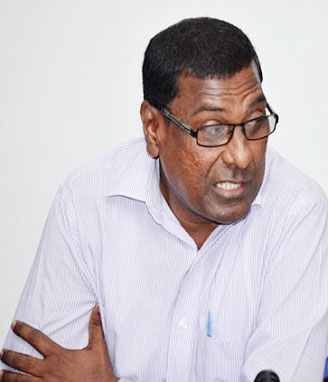As the Ministry of Public Health continues to monitor the increasingly troubling Zika Virus, Chief Medical Officer (CMO) Shamdeo Persaud is calling on members of the public to assist in controlling the population of the mosquito vector and using protection to avoid being bitten.
The Pan American Health Organisation/World Health Organisation (PAHO/WHO) has said that Zika, which has been linked to neurological diseases in both new-borns and adults, is most effectively prevented by “reducing mosquito populations by eliminating their potential breeding sites, especially containers and other items (such as discarded tires) that can collect water in and around households; and using personal protection measures to prevent mosquito bites.”

Persaud told Stabroek News on Tuesday that the Public Health Ministry in collaboration with regional authorities is conducting a continuous “fogging” exercise to help in the reduction of the vector population.
“The fogging continues on the East Coast, in Georgetown and on the East Bank, that corridor which is the main thoroughfare or hub. We have also had intensive fogging in the entire Rose Hall Town, which is the origin of the index case,” he said.
Even as these efforts continue, Persaud stressed that it is essential that vector inspections of homes are conducted by individuals.
“We need to remove breeding sites, empty containers and inspect water storage tanks. The Aedes [aegypti] is a clean water mosquito, you won’t find it in stagnant trenches, you mostly find it in those black tanks and we need persons to pay keen attention there if we are going to manage the population,” he said.
Persaud also stressed the importance of taking measures to protect yourself from mosquito bites. He noted that while the Ministry is presently distributing treated mosquito nets at ante-natal clinics and advising persons to buy and use mosquito nets, it would take more than nets to protect the population.
“Protection from transmission is not just a mosquito net. The net is good but a comprehensive effort is needed not just hanging a net on your bed and jumping under it at 10 in the night. What about between 5, 6, 7, 8 o’clock when the mosquito following you? Aedes is a daytime, evening and morning mosquito. It is around all the time, so you must protect yourself all the time. Wear your long sleeved clothes and cover your legs. Wear repellent,” he advised.
Persaud stressed that even as efforts are focused on Zika, other diseases spread by the mosquito must not be forgotten.
“We can’t forget Chikungunya. It is still a merciless disease which is present in our country. Be cautious and follow the vector control methods,” he said.
The Zika virus is related to Yellow Fever, West Nile, Chikungunya and Dengue. Like the other viruses in the family, Zika is transmitted when an Aedes mosquito bites a person with an active infection and then spreads the virus by biting others. Though only one in four persons bitten develop symptoms of Zika, those people then become carriers during the time they have symptoms.
Unlike the other viruses, no treatment or vaccine yet exists for Zika.
Before 2015, Zika was a relatively unknown virus existing within the regions of Africa and Asia. However, since then Zika has been aggressively travelling through the Americas. A PAHO/WHO statement on the virus notes that “since Brazil reported the first cases of local transmission of the virus in May 2015, it has spread to 21 countries and territories of the Americas as of 23 January 2016.” Guyana is one of those territories.
Major concerns about Zika arose after it became linked to several neurological diseases. Brazil has reported a growing number of cases of women delivering babies with microcephaly–incomplete brain development–believed to be linked to the virus. PAHO notes that while the country has between 2010 and 2014, reported a yearly average of 163 microcephaly cases, there have been between October, 2015 and the first week of this year 3,530 microcephaly cases recorded. These cases include 46 deaths, in 20 states and the Federal District. There is also evidence which links Zika to Guillain-Barré syndrome (GBS), which results in adult paralysis.
The first case of Zika virus in Guyana was confirmed by Minister of Public Health Dr George Norton, who told the National Assembly on January 14 that a taken from a 27-year-old female, whose address is listed as both Rose Hall, Corentyne and Garden of Eden, East Bank Demerara, had tested positive for the virus. Since that time, there has been no other confirmed case though two other samples have been sent for test at the Caribbean Public Health Agency (CARPHA), the only laboratory in the region with the facilities to confirm the virus.




